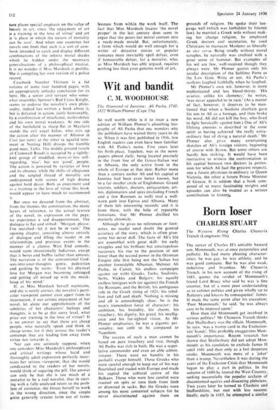Wit and bandit C. M. WOODHOUSE The Diamond of lannina:
Ali Pasha, 1741- 1822 William Plomer (Cape 35s)
So well worth while is it to issue a new edition of William Plomer's absorbing bio- graphy of All Pasha that one wonders why the publishers have waited thirty years to do so. When it was first published in 1936, few English readers can even have been familiar with Ali Pasha's name. Five years later his birth-place, Tepeleni, was in the news- papers almost daily, being located precisely in the front line of the Greco-Italian war in Albania, the only active front in the whole of Europe at that date. Rather more than a century earlier Ali and his capital at Jannina had been even better known, but to a far smaller circle of Englishmen. Grand tourists, soldiers, doctors, antiquarians, art- ists, diplomatists and spies (including French and a few Russians as well) trod a well- worn path into Epirus and Albania. Many of them left interesting records; and it is from these, with the help of reputable historians, that Mr Plomer distilled his masterly chronicle.
Although he gives no references or foot- notes, no reader need doubt the general accuracy of the story, which is often grue- some but never dull. The facts of Ali's life are assembled with great skill: his early struggles and his brilliant but unscrupulous successes; his rise to the position of not lower than the second power in the Ottoman Empire (the first being not the Sultan but another formidable Albanian, Mehmet Ali Pasha, in Cairo); his endless campaigns against for with) Greeks, Turks, Souliotes, Serbs, Vlakhs and Bulgars; his equally endless intrigues with (or against) the French the Russians, and the British; his ambiguous role in the Greek rising of 1821; his rebel- lion and fall and death. Nothing is missing and all is astonishingly clear. So is the man's tremendous force of character: his ambition, his brutality, his charm, his treachery, his dignity, his greed. his intellig- ence and his far-sighted vision. As Mr Plomer emphasises. he was a gigantic per- sonality, not unfit to be compared to Napoleon.
The success of such a man cannot be based on pure treachery and vice, though Ali Pasha was rich in both. He was a super- lative commander and even an able admin- istrator. There were no bandits in his pashalik except himself. Those Greeks who were careful enough to keep out of his way flourished and traded with Europe and made his capital the cultural centre of the Balkans. Those who were less careful were roasted on spits or torn limb from limb or drowned in sacks. But the Greeks were among his most contented subjects for he never discriminated against them on
grounds of religion. He spoke their lan- guage well (which was forbidden by Islamic law), he married a Greek wife without mak- ing her change religion, he employed Greek doctors and secretaries, he used Christians to massacre Moslems as liberally as vice versa. Being totally without moral scruples, he naturally was credited with a great sense of humour. But examples of his wit are few, well-received though they always were. Mr Plomer quotes only his jocular description of the Sublime Porte as the Low Gate. Witty or not. All Pasha's acolytes laughed faithfully when he laughed.
Mr Plomer's own wit, however, is more sophisticated and less blood-thirsty. 'His
avarice, unlike his clemency,' he writes, 'was never appealed to in vain.' (As a matter of fact, however, it deserves to be men- tioned that when a Souliote chieftain gave his son to Ali as a hostage, and then broke his word, All did not kill the boy, who lived to fight heroically against him.) One of Ali's lifelong enemies is described in the same spirit as having achieved the really extra- ordinary feat of dying a natural death.' Mr Plomer also gives many entertaining sketches of Ali's foreign visitors, beginning of course with Byron. But some others are hardly less striking. It would have been instructive to witness the confrontation at his capital between two doctors (a profes- sion for which Ali had the greatest respect), one a future physician-in-ordinary to Queen Victoria, the other a future Prime Minister of Greece. It is seldom that a book com- posed of so many fascinating insights and episodes can also be treated as a serious contribution to history,






































 Previous page
Previous page